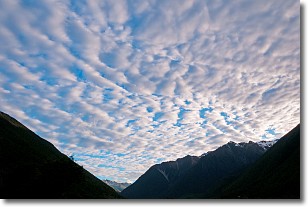Weather Alert in Alaska
High Surf Advisory issued August 10 at 5:16AM AKDT until August 12 at 10:00PM AKDT by NWS Anchorage AK
AREAS AFFECTED: Kuskokwim Delta Coast and Nunivak Island
DESCRIPTION: * WHAT...Water levels 1 to 2 feet above the normal highest tide line. Wave heights between 4 to 8 feet along the coast. * WHERE...Along the Kuskokwim Delta Coast, including the communities of Kwigillingok, Kongiganak, and Kipnuk. * WHEN...From 10 AM AKDT Monday to 10 PM AKDT Tuesday. * IMPACTS...Localized coastal erosion may occur. * ADDITIONAL DETAILS...There will be 2 peaks of high water occurring around high tide. The first occurs Monday afternoon and the second on Tuesday afternoon. The strongest push of southerly winds into the coast, with gusts between 40 to 50 mph, will be Monday afternoon into Tuesday morning. However, southerly fetch and winds will linger through Tuesday evening causing wave heights to be slow to subside along the coast.
INSTRUCTION: A high surf advisory means that high surf will affect beaches in the advisory area, producing rip currents and localized beach erosion.
Want more detail? Get the Complete 7 Day and Night Detailed Forecast!
Current U.S. National Radar--Current
The Current National Weather Radar is shown below with a UTC Time (subtract 5 hours from UTC to get Eastern Time).

National Weather Forecast--Current
The Current National Weather Forecast and National Weather Map are shown below.

National Weather Forecast for Tomorrow
Tomorrow National Weather Forecast and Tomorrow National Weather Map are show below.

North America Water Vapor (Moisture)
This map shows recent moisture content over North America. Bright and colored areas show high moisture (ie, clouds); brown indicates very little moisture present; black indicates no moisture.

Weather Topic: What is Snow?
Home - Education - Precipitation - Snow
 Next Topic: Stratocumulus Clouds
Next Topic: Stratocumulus Clouds
Snow is precipitation taking the form of ice crystals. Each ice crystal, or snowflake,
has unique characteristics, but all of them grow in a hexagonal structure.
Snowfall can last for sustained periods of time and result in significant buildup
of snow on the ground.
On the earth's surface, snow starts out light and powdery, but as it begins to melt
it tends to become more granular, producing small bits of ice which have the consistency of
sand. After several cycles of melting and freezing, snow can become very dense
and ice-like, commonly known as snow pack.
Next Topic: Stratocumulus Clouds
Weather Topic: What are Stratus Clouds?
Home - Education - Cloud Types - Stratus Clouds
 Next Topic: Wall Clouds
Next Topic: Wall Clouds
Stratus clouds are similar to altostratus clouds, but form at a
lower altitude and are identified by their fog-like appearance, lacking the
distinguishing features of most clouds.
Stratus clouds are wider than most clouds, and their base has a smooth, uniform
look which is lighter in color than a nimbostratus cloud.
The presence of a stratus cloud indicates the possibility of minor precipitation,
such as drizzle, but heavier precipitation does not typically arrive in the form
of a stratus cloud.
Next Topic: Wall Clouds
Current conditions powered by WeatherAPI.com




